Meaning of the Word Bethel in the Bible: House of God
‘Bethel,’ derived from the Hebrew words ‘beth’ (house) and ‘El’ (God), translates to ‘House of God.’ This term holds significant theological importance within the biblical narrative, symbolizing a sacred space for divine revelation and worship. Prominent in the stories of patriarchs, Bethel is where Abraham built an altar and where Jacob experienced a vision of a heavenly ladder.
It later became a notable site for worship and prophecy in the Kingdom of Israel, although its sanctity was contested by prophets. Understanding Bethel’s evolving role offers deeper insights into the spiritual and historical journey of the Israelites.

Meaning of the Word Bethel in the Bible: Historical Significance and Spiritual Insights
| Aspect | Details |
|---|---|
| Definition | Bethel means “House of God” in Hebrew, combining “Beth” (house) and “El” (God). |
| Key Bible Verses | Genesis 28:19 (Jacob names the place Bethel), Genesis 12:8 (Abraham builds an altar near Bethel). |
| Historical Context | A significant location in biblical history, Bethel was a center for worship and divine encounters. |
| Jacob’s Vision | Jacob experienced a dream of a ladder connecting heaven and earth at Bethel, symbolizing God’s covenant (Genesis 28:12-17). |
| Role in Worship | Bethel became a site for altars and worship, including in the time of the patriarchs and the divided kingdom. |
| Spiritual Significance | Symbolizes God’s presence, divine revelation, and a place of renewal and commitment to God. |
| Prophetic References | Bethel is mentioned in prophetic books, often highlighting its transformation into a place of idol worship (Amos 5:5). |
| Modern Implications | Represents a personal place or moment of encountering God, fostering faith and spiritual renewal. |
| Purpose in Faith | Encourages believers to seek God’s presence and cherish moments of divine connection and guidance. |
Etymology of Bethel
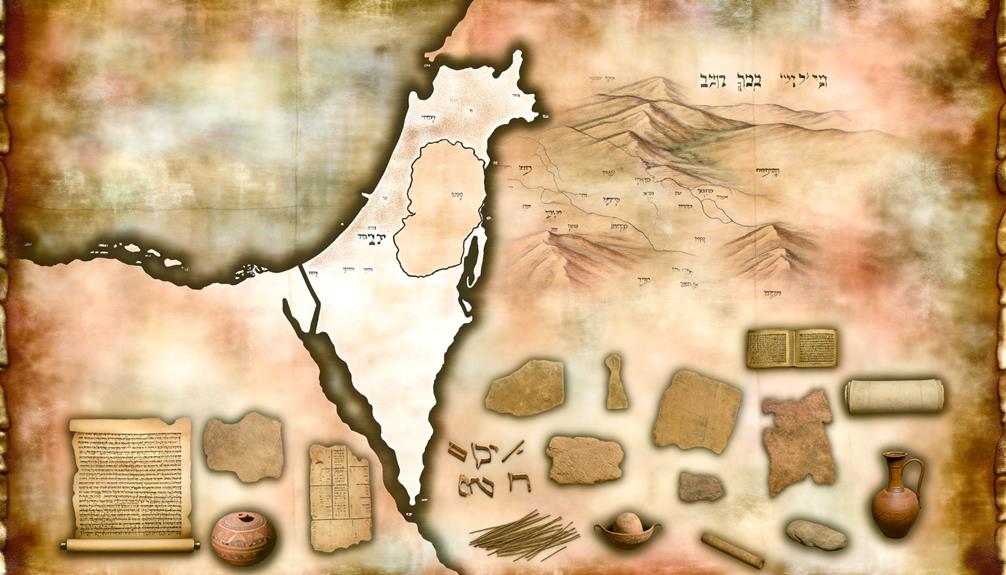
The etymology of Bethel, derived from the Hebrew words ‘beth’ (house) and ‘El’ (God), translates to ‘House of God.’ This nomenclature underscores its theological significance within the biblical narrative.
In ancient Semitic cultures, naming conventions often reflected religious beliefs and societal values. ‘Bethel’ is more than a mere geographical designation; it embodies a locus of divine encounter and worship.
The term ‘El’ itself is one of the earliest designations for God in the Hebrew language, denoting a supreme deity in a polytheistic context that gradually evolved into monotheism.
Consequently, the name ‘Bethel’ not only identifies a physical place but also encapsulates a profound spiritual heritage, emphasizing the intersection of sacred space and divine presence in biblical history.
Bethel in Abraham’s Journey
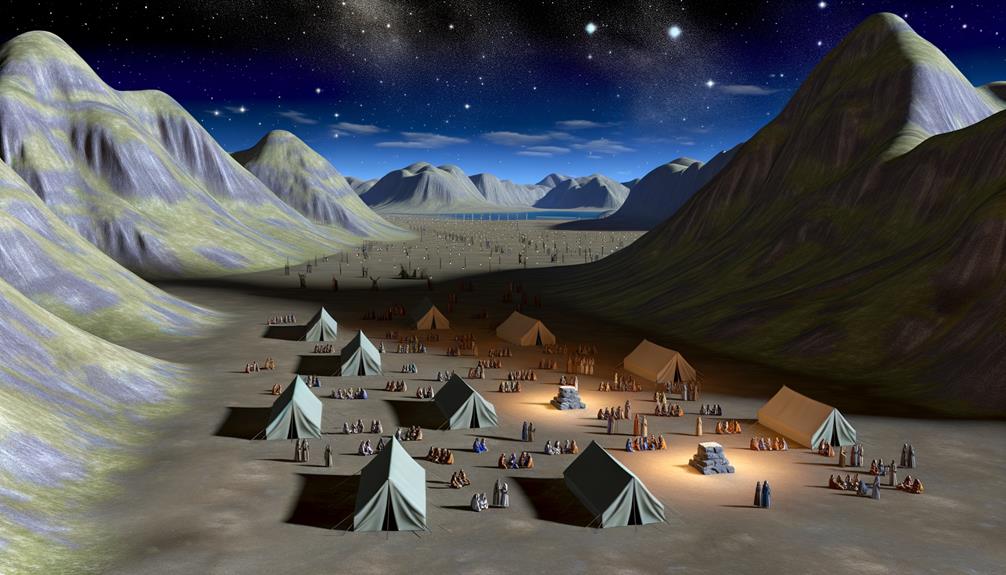
In the narrative of Abraham’s journey, Bethel emerges as a pivotal location where he constructs an altar to Yahweh, symbolizing his deepening relationship with the divine.
This site not only marks a physical waypoint in his travels but also underscores the spiritual significance of Bethel in the covenantal promises made to Abraham.
Abraham’s Altar at Bethel
During Abraham’s journey, Bethel emerges as a significant location where he builds an altar, symbolizing faith and divine encounter. This act marks Bethel as a place of worship and covenant for Abraham, reinforcing his relationship with God.
The altar at Bethel, as described in Genesis 12:8 and 13:3-4, serves as a tangible manifestation of Abraham’s obedience and reverence. It also illustrates the physical and spiritual journeys intertwined in biblical narratives.
| Aspect | Details |
|---|---|
| Location | Bethel, ancient Canaan |
| Biblical Reference | Genesis 12:8; 13:3-4 |
| Purpose | Worship and divine encounter |
| Symbolism | Faith, obedience, covenant |
| Impact | Reinforces Abraham’s relationship with God |
This analytical perspective underscores Bethel’s theological importance in Abraham’s life.
Bethel’s Significance in Covenant
Bethel’s role in Abraham’s covenantal journey epitomizes the intersection of divine promise and human faithfulness. Situated strategically within the narrative, Bethel serves as a landmark where Abraham reaffirms his commitment to God’s covenant.
In Genesis 12:8, Abraham constructs an altar at Bethel, symbolizing his devotion and the establishment of a sacred space for divine communication. This act underscores the theological significance of Bethel as a site of covenantal reaffirmation.
Additionally, Bethel’s repeated mention in Abraham’s travels accentuates its role as a spiritual waypoint, a place where divine assurances are revisited, and faith is renewed. Consequently, Bethel becomes more than a geographic location; it is an indication of the enduring relationship between God and Abraham, foundational to Israel’s faith heritage.
Jacob’s Vision at Bethel
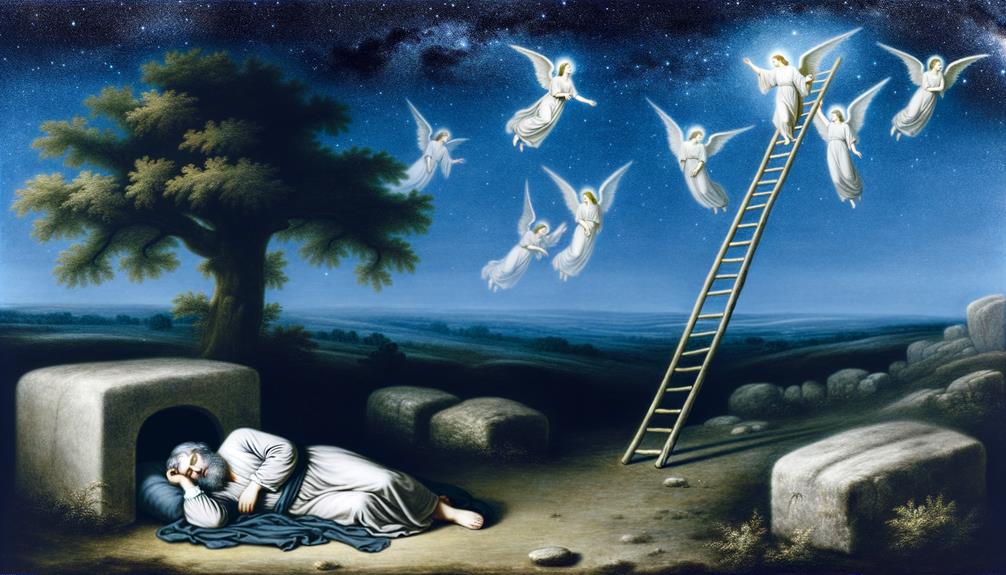
As Jacob journeyed from Beersheba to Haran, he experienced a profound theophany at Bethel that would significantly shape the theological narrative of the Hebrew Scriptures.
In Genesis 28:10-19, Jacob dreams of a ladder reaching to heaven with angels ascending and descending, symbolizing divine-human interaction. Yahweh’s reiteration of the Abrahamic covenant promises—land, descendants, and blessing—transforms Jacob’s understanding of his role in God’s plan.
This vision establishes Bethel, meaning ‘House of God,’ as a pivotal locus of divine revelation and covenantal affirmation. Jacob’s subsequent vow to Yahweh underscores the personal and communal implications of this divine encounter, solidifying Bethel’s significance in Israel’s religious consciousness. It is in such sacred spaces that individuals and communities can experience a profound connection with the divine, fostering a deeper understanding of God’s promises. Additionally, as believers reflect on pivotal moments in their faith, they may also explore concepts like the meaning of noel in the bible, which highlights the joyous celebration of Christ’s birth and its transformative power for all who seek a relationship with God. Such themes intertwine, enriching the spiritual heritage that shapes both personal faith journeys and collective worship practices.
This event marks a foundational moment in biblical theology, emphasizing divine fidelity and human response.
Bethel as a Worship Site

Bethel holds a pivotal role as a worship site, underscored by its historical significance where key religious practices were established.
Jacob’s dream at Bethel not only solidified its sanctity but also laid the foundation for its recurring mention in biblical narratives.
These elements collectively highlight Bethel’s importance in the spiritual life of the Israelites and its enduring legacy in Judeo-Christian traditions.
Historical Significance
Serving as a prominent location for religious activities, Bethel holds considerable historical significance as a key worship site in biblical narratives. Its role as a spiritual center is underscored by numerous scriptural references, establishing it as a focal point for worship and divine encounters.
- Patriarchal Altars: Abraham and Jacob erected altars here, signifying covenantal relationships with God.
- National Worship: Under Jeroboam, Bethel became one of the principal centers of worship in the Northern Kingdom of Israel.
- Prophetic Activity: Prophets like Amos and Hosea delivered significant prophecies at Bethel, condemning idolatry.
- Monarchical Influence: Kings of Israel often visited Bethel, impacting its religious and political landscape.
This multifaceted significance solidifies Bethel’s place in biblical history.
Jacob’s Dream
Jacob’s dream at Bethel symbolizes a pivotal moment in biblical history, where the divine covenant is reaffirmed through a profound, visionary experience.
As recounted in Genesis 28:10-22, Jacob dreams of a ladder reaching to heaven, with angels ascending and descending. This theophany signifies God’s continued presence and the unbroken lineage of His promises to Abraham and Isaac.
Bethel, meaning ‘House of God,’ becomes an emblematic site where the earthly and divine domains intersect. The dream’s aftermath sees Jacob consecrating the stone he slept upon, marking Bethel as a sacred locus for worship.
This event underscores Bethel’s role in the spiritual and historical narrative of the Israelites, serving as a tangible reminder of divine favor and covenantal faithfulness.
Religious Practices
As a pivotal worship site in the biblical narrative, Bethel stands as a focal point for the religious practices and communal rites of the Israelite people. Its significance is underscored by various scriptural references and its role in the socio-religious landscape of ancient Israel.
Jacob set up a pillar and poured oil on it, consecrating Bethel as a sacred place (Genesis 28:18-19).
It became one of the centers for worship, especially during the time of the divided kingdom (1 Kings 12:28-29).
Prophets like Amos and Hosea referenced Bethel in their calls for religious reform.
Judges and leaders gathered here for significant decisions (Judges 20:18).
Bethel remained a site of pilgrimage and worship throughout Israelite history.
Bethel in the Kingdom of Israel
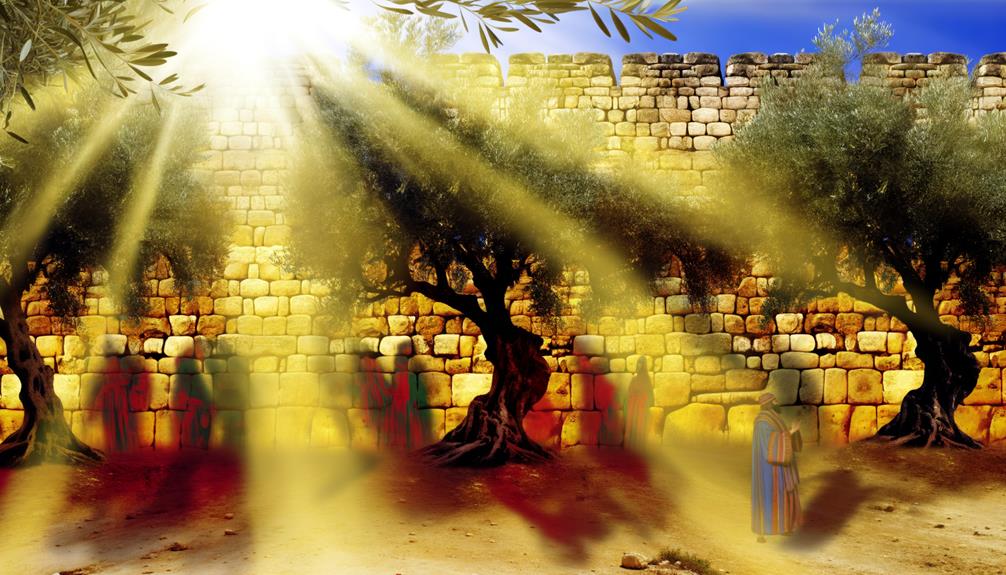
Bethel’s significance in the Kingdom of Israel is underscored by its role as a central religious and political hub during the divided monarchy. As a major site of worship, Bethel housed one of the two golden calves erected by King Jeroboam I to dissuade Israelites from traveling to Jerusalem, thereby altering the religious landscape.
| Aspect | Details |
|---|---|
| Religious Role | Site of one of Jeroboam’s golden calves |
| Political Role | Strategic location influencing northern Israelite control |
| Historical Context | Functioned prominently during the divided monarchy (ca. 930–722 BCE) |
| Archaeological Finds | Evidence of city fortifications and cultic installations |
This dual-purpose utility of Bethel reflects its integral position in Israel’s socio-political and religious framework, fostering an alternative worship center that aimed to consolidate the northern kingdom’s identity.
Prophetic References to Bethel
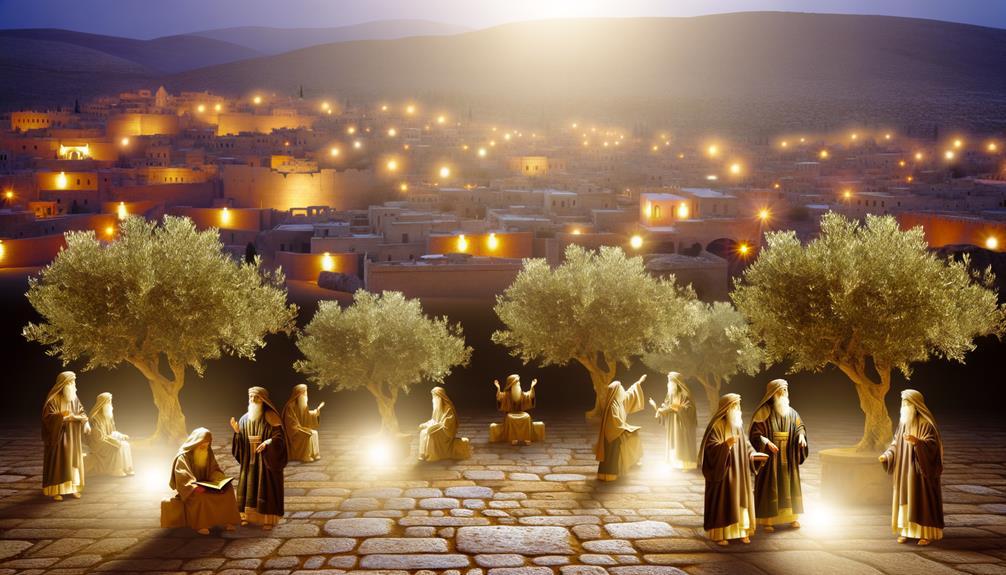
The prophetic literature of the Hebrew Bible frequently references Bethel, highlighting its significance and the complexities associated with its religious practices.
Prophets such as Amos and Hosea critique Bethel for its idolatrous activities, emphasizing its departure from true worship. The site’s dual identity as both a sacred location and a center of apostasy is a focal point for prophetic admonitions.
- Amos 3:14 condemns the altars of Bethel, symbolizing judgment against corrupt worship.
- Hosea 10:15 anticipates the destruction of Bethel, reflecting divine displeasure.
- Jeremiah 48:13 warns of misplaced trust in Bethel’s idols.
- 1 Kings 12:29 details the establishment of a golden calf at Bethel, initiating its decline.
These references illustrate Bethel’s complex religious and prophetic legacy.
Bethel in New Testament Context
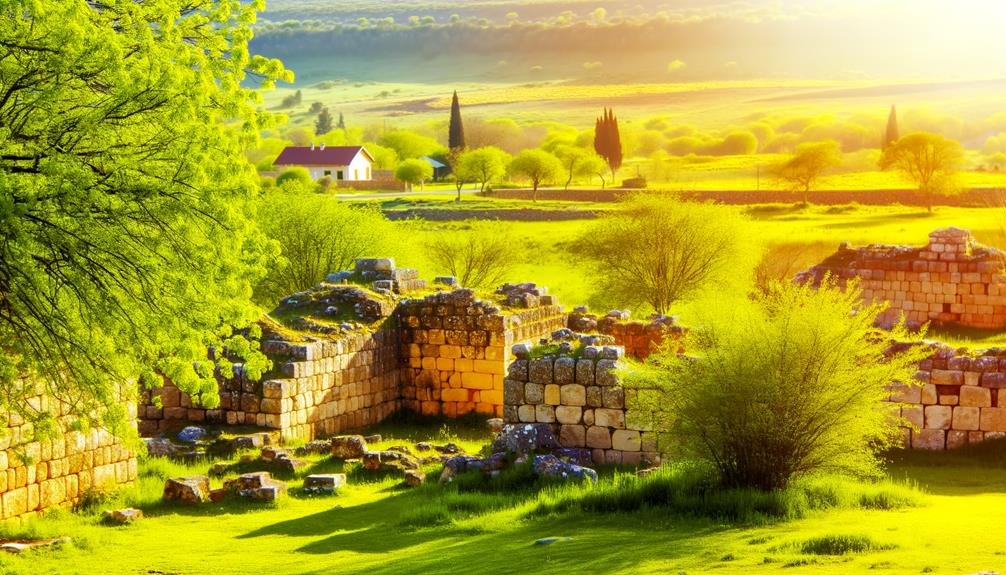
While Bethel does not feature prominently in the New scripture, its historical and theological implications from the Hebrew Bible continue to influence early Christian thought and literature.
The significance of Bethel as a place of divine encounter and covenant-making, primarily established in the Old Testament, permeates early Christian writings by providing a foundational understanding of sacred spaces and divine-human interactions.
Bethel’s legacy underscores the continuity of God’s promises and presence from the Hebrew Bible into the New Testament.
Additionally, it serves as a typological precursor, symbolizing the shift from physical locations of worship to the internal, spiritual communion emphasized in Christian doctrine.
Consequently, Bethel’s enduring heritage contributes to the theological framework of early Christianity.
Lessons From Bethel
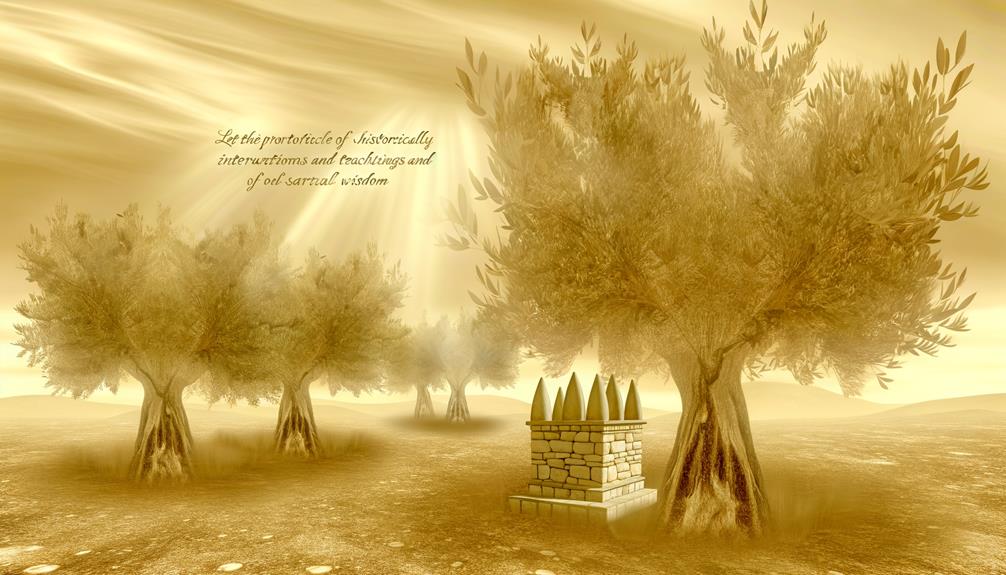
Understanding the enduring influence of Bethel in early Christian thought invites a closer examination of the lessons derived from its biblical narrative. Bethel, a site of divine encounters and covenantal promises, offers profound insights for contemporary faith practice.
- Divine Presence: Bethel symbolizes the assurance of God’s presence in life’s journey.
- Covenantal Faithfulness: It underscores the importance of maintaining fidelity to divine promises.
- Spiritual Renewal: Bethel serves as a place for spiritual awakening and recommitment.
- Pilgrimage and Worship: It highlights the significance of sacred places in fostering communal worship.
- Transformative Encounters: The narratives at Bethel illustrate transformative experiences that reshape individual destinies.
These lessons collectively emphasize Bethel’s role as a cornerstone in understanding divine-human interaction.
Conclusion
Bethel, like a beacon in the tapestry of biblical history, symbolizes the spiritual journey from divine encounter to national sanctity and prophetic admonition.
Through Abraham’s pilgrimages, Jacob’s visions, and its role in Israel’s religious and political life, Bethel emerges as an allegory of humanity’s quest for divine connection and moral rectitude.
The multifaceted references to Bethel in both Old and New Scriptures underscore its enduring significance, offering timeless lessons on faith, devotion, and spiritual enlightenment.






